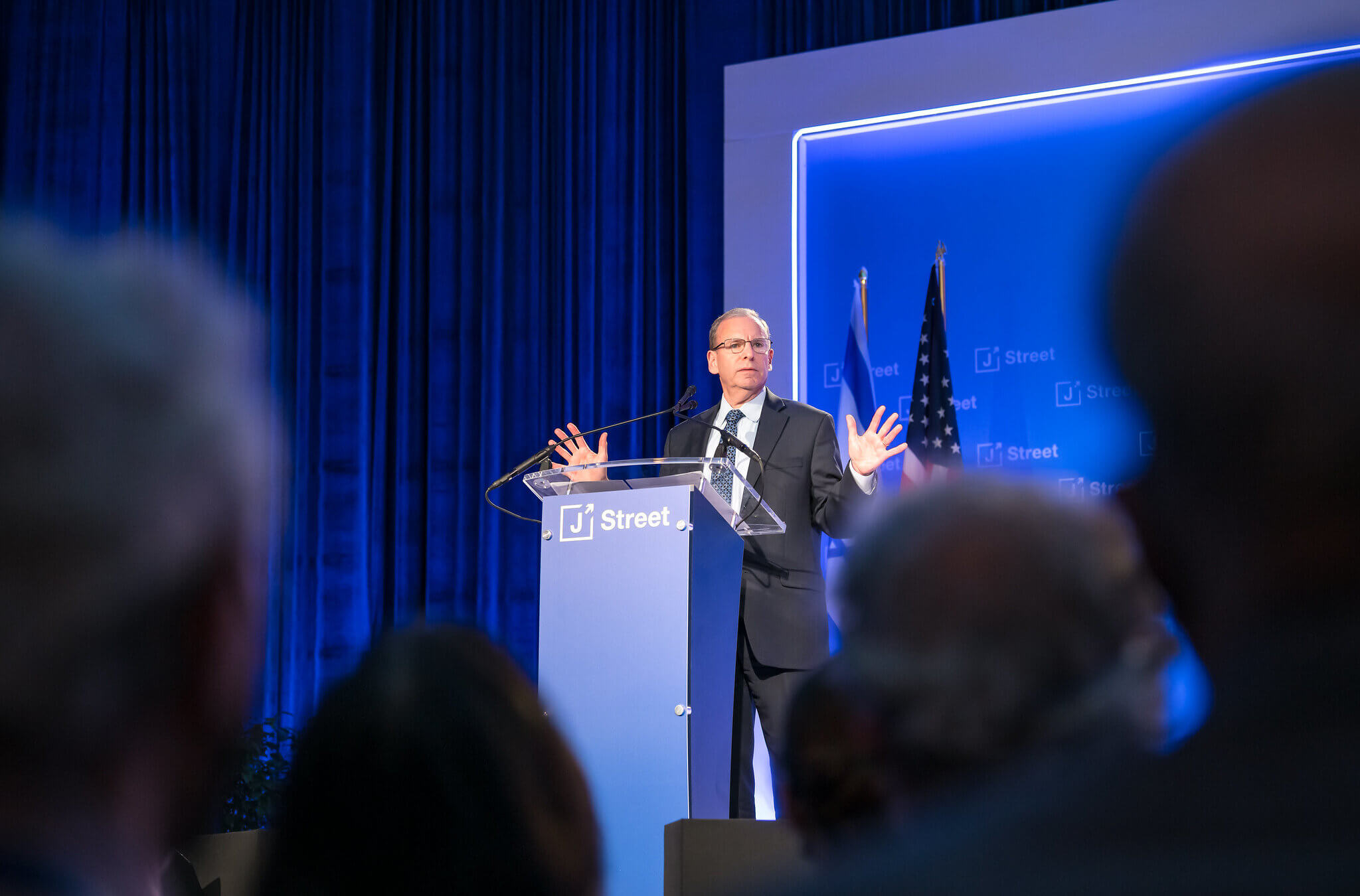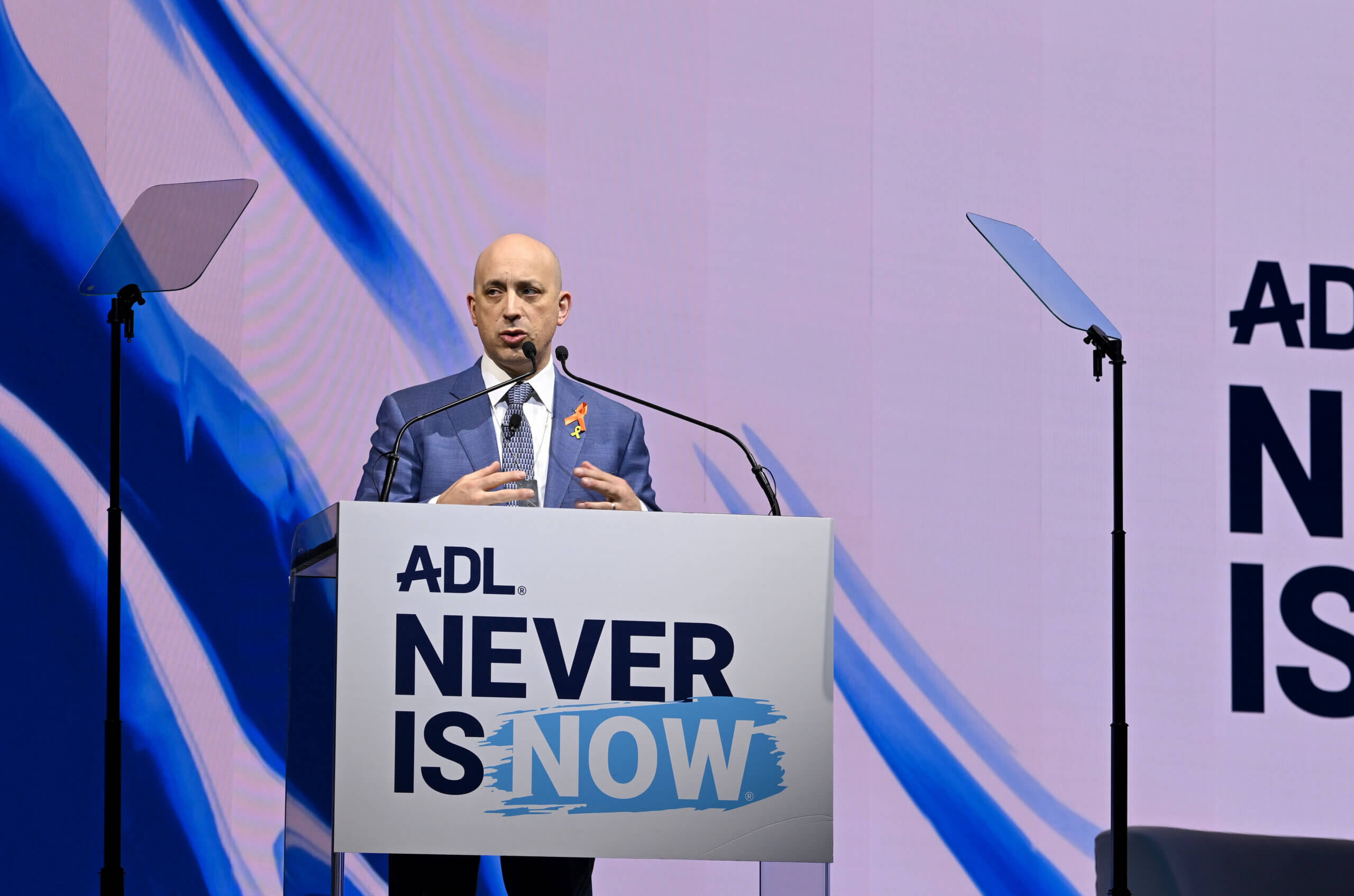Exclusive: J Street spurns ADL in teachers union fight, saying its approach ‘demeans the meaning of antisemitism’
J Street’s move comes as progressives show increasing anger at the ADL’s uncompromising defense of Israel

J Street President Jeremy Ben-Ami speaks at the organization’s 2022 national conference in Washington, D.C. Courtesy of J Street
J Street is declining to back the Anti-Defamation League in its battle with the nation’s largest teachers union, saying the venerable Jewish civil rights group is no longer a reliable arbiter of antisemitism.
The National Education Association voted last week to suspend its ties with the ADL over the organization’s defense of Israel.
In response, the advocacy organization on Monday marshalled a massive showing of support, with nearly 400 Jewish groups from across the political spectrum signing a letter defending the ADL.
J Street does not support the NEA resolution but is increasingly at odds with the ADL, which under the leadership of Jonathan Greenblatt has become more blunt in describing strident criticism of Israel as antisemitic.
The split comes as progressives in Jewish and non-Jewish spaces have grown frustrated with Greenblatt, who has defended the Trump administration’s crackdown on universities and at times excused the far-right tendencies of billionaire Elon Musk.
The ADL-led letter, which described the National Education Association resolution as part of a “growing level of antisemitic activity within teachers’ unions,” was signed by the ADL’s traditional allies, including the Jewish Federations network, as well as an array of progressive groups. Among these were the Reform movement and the Jewish Council for Public Affairs.
J Street instead released its own statement slamming the ADL’s response to the NEA vote, including its initial claim that the vote was driven by “pro-Hamas” activists within the union.
“This rhetoric and approach demeans the meaning of antisemitism and runs the risk of fanning its flames,” Jeremy Ben-Ami, J Street’s president, said in the statement shared with the Forward.
It was a notable break with the ADL, which virtually the entire Jewish community has long relied upon to monitor and respond to antisemitic incidents.
The ADL in 2014, under Greenblatt’s legendary predecessor, Abe Foxman, lobbied unsuccessfully to bring the J Street into the Conference of Presidents of Major American Jewish Organizations, the community’s foreign policy umbrella.
Now, Ben-Ami says, he and Greenblatt are not on speaking terms.

The ADL under Greenblatt has focused resources on combatting anti-Zionism, changing the organization’s methodology for tracking antisemitic incidents to count many protests against Israel and comparing student protesters on college campuses to al-Qaida.
Greenblatt says anti-Zionism is antisemitism, “full stop.”
“We’re not looking to pick an organizational food fight,” Ben-Ami said in an interview. “We just felt uncomfortable sending the signal that joining in this letter would have sent that the entirety of the Jewish community is united behind the approach that the ADL is taking.”
Todd Gutnick, an ADL spokesperson, said that the organization retained broad support.
“The NEA vote was an attack not just on ADL directly, but on the Jewish community and Holocaust and antisemitism education more broadly,” Gutnick said in an email. “That’s why nearly 400 Jewish groups — representing every political, religious, denominational and geographic perspective — have signed on to this letter.”
Widening rift between ADL and progressives
Greenblatt’s pivot to making Israel the ADL’s preeminent issue has breathed life into campaigns by some progressives, who have long opposed the organization’s support for Israel, to boycott the ADL. NEA members at its national convention voted to stop working with the ADL and using its materials.
The vote, which was extremely close, must now be approved by several leadership bodies of the NEA. The letter signed by 378 groups and addressed to union president Becky Pringle called on her to reject the measure and represented a show of force from the ADL.
It was signed by nearly every major national Jewish group including some, like Hillel International, that have recently butted heads with the ADL over strategic differences. Also signing were dozens of local synagogues and organizations.
“It is our belief that the goal of those who introduced NBI 39 is to marginalize mainstream Jewish voices within this country’s public school systems and to limit the ability of educators to address the growing threat of antisemitism with their students,” the letter stated.
The Jewish Council for Public Affairs, which has been the loudest voice in the Jewish establishment calling for a more moderate approach to countering antisemitism related to Israel, signed the letter but also released its own statement praising the union’s “hunger for more robust and direct engagement on antisemitism.”
The JCPA noted that it was invited to lead a training on antisemitism and the conference, where union members also passed resolutions at its conference recognizing Jewish American Heritage Month and endorsing the State Department’s definition of antisemitism, which closely matches language supported by the ADL.
The spat between NEA members and the ADL comes after two years in which teachers unions in California, Massachusetts and elsewhere have waded into the Israeli-Palestinian conflict by supporting teachers who oppose Israel’s war in Gaza, sometimes in ways that have alienated many Jewish families.
J Street has recently joined debates over where to draw the line on criticism of Israel. The group’s campus affiliate criticized the ADL’s campus report card last year, which also raised the hackles of Hillel International, in what appeared to be the first public break between J Street and the 112-year-old Jewish civil rights group.
Ben-Ami said in the statement that J Street was alarmed by “white-hot campus tensions, which too often cross the line into outright antisemitism,” and did not agree with the NEA resolution.
“We cannot afford for leading educators and leading Jewish groups to be hurling accusations and retreating into their corners,” he said.

















